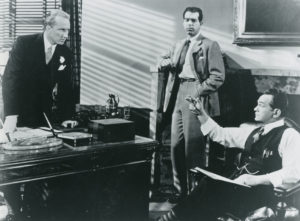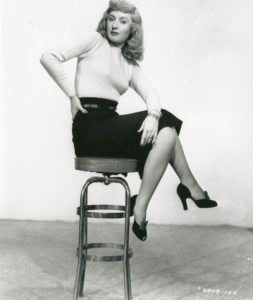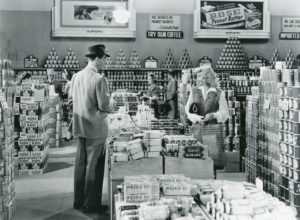by Barb Lentz.
The five movies Bob provided me from which to choose are these:
Double Indemnity (1944)
The Hill (1965)
Kind Lady (1951)
The Old Dark House (1932)
The Temptress (1926)
I chose Double Indemnity because it was a familiar title that I had never seen. The others looked interesting but I had always wanted to see Double Indemnity, so this was an easy choice.

It was pretty much what I expected, only more so. I knew it was a murder mystery involving insurance, and that it was supposed to be an effective psychological study. What I didn’t expect was that it was so light. For a film noir, much of it takes place during the day, and many touches of humor are sprinkled throughout. The material is certainly dark, but it isn’t always handled that way.
Insurance salesman Walter Neff (Fred MacMurray) is seduced by lonely wife Phyllis Dietrichson (Barbara Stanwyck), and before he knows it, he has agreed to kill her husband. Neff almost backs out of it but Phyllis has planned her seduction well. Afterward, they seem to have gotten away with murder, until Neff’s co-worker Barton Keyes (Edward G. Robinson), a human bloodhound, sniffs something ill in the wind. Then it’s just a matter of who will break first.
The situation is a tangled web, yet presented with remarkable clarity and precision by director Billy Wilder and screenwriter Raymond Chandler. Their understanding of basic human nature is authentic and clever, and we find ourselves hoping, at least some of the time and against all reason, that Phyllis and Walter actually get away with it. Near the end of the story, at almost the last possible moment, Neff proves that he has a conscience and saves an innocent man from being blamed with murder. All that is left is for him to explain to Keyes how he made such poor decisions and confess his sins.
My top five moments of the movie are:

1. The acting of the leads. Fred MacMurray is a revelation; it’s hard to believe this is the same guy who made “My Three Sons” and The Absent-Minded Professor. Barbara Stanwyck is a force of nature; it’s easy to see where Kathleen Turner got her inspiration for Body Heat. And Edward G. Robinson is simply great as Keyes; he underplays all the important moments.
2. The psychological angle, especially involving Phyllis’ step-daughter Lola (Jean Heather). Complications are necessary to create truly compelling drama, and involving Phyllis’ step-daughter with both Walter Neff and the prickly Nino Zachetti (Byron Barr) certainly humanized this tale of pre-meditated murder. Ultimately it is Lola’s influence which leads to Neff’s undoing, and Phyllis’ own demise.
3. Walter Neff’s conscience. While the film is narrated by Neff, and he goes through with an act which is indefensible, Walter finally realizes that he has trapped himself because of desire and greed. He could have continued to fool himself regarding Phyllis and his alleged aloofness, but he finally accepts his actions for what they are, and accepts the consequences. I was afraid that he might try to go out in a blaze of glory, but he was too good for that, and I appreciated the movie for letting him finish things the way that he does.
4. The authentic glimpse of the insurance industry. Few films delve into insurance dealings because, well, they are boring. But this one at least shares the realistic view that the head guy never ever wants to pay any claim that he doesn’t have to. Seeing the way the office works is at once disheartening and educational and infuriating.
5. The set design and look of the film. After more than seventy years this film is a time capsule of how people lived and worked during the World War II era. I especially liked the supermarket where Phyllis and Walter rendezvous, which is much nicer and attractive than stores today. The cars, the clothes, the production design, are all of a time now long past, yet still accessible through movies such as this one.

The time capsule reference is quite apt, I feel. The film is dated in terms of those cars, clothes and sets; telephone booths and train cars where one can actually go outside are things young people now will never know. The story would have to be reworked in order to take place today. Yet that does not mean the film is an antique. It is vibrantly alive because its story is still viable, its understanding is so complete and its performances so convincing.
Is Double Indemnity a classic? Yes it is. Despite its dated aspects it remains a sharp, suspenseful exploration of the dark side of human nature. Its intricate story is fascinatingly told; it could have been intensely repellent, and yet it isn’t. Billy Wilder deftly manages to tell a completely sordid story in a fresh, captivating way, mainly by balancing the heinous crime with Keyes’ half-comical, half-serious bloodhound instincts of sniffing it out as non-accidental. One can see where and how the story was diluted because of the era, and yet even that means that the central conflict remains at the forefront. It is a powerful film that has earned its reputation as a classic of American cinema.
BRL 31 May 2016.
Double Indemnity (September 6, 1944) Paramount Pictures
Directed by Billy Wilder. Produced by Joseph Sistrom.
Screenplay by Billy Wilder and Raymond Chandler. Based upon the novel by James M. Cain.
Principal Cast (character, performer):
Walter Neff Fred MacMurray
Phyllis Dietrichson Barbara Stanwyck
Barton Keyes Edward G. Robinson
Mr. Jackson Porter Hall
Lola Dietrichson Jean Heather
Mr. Dietrichson Tom Powers
Nino Zachetti Byron Barr
Edward S. Norton, Jr. Richard Gaines
107 minutes. Black and White. Not Rated.
